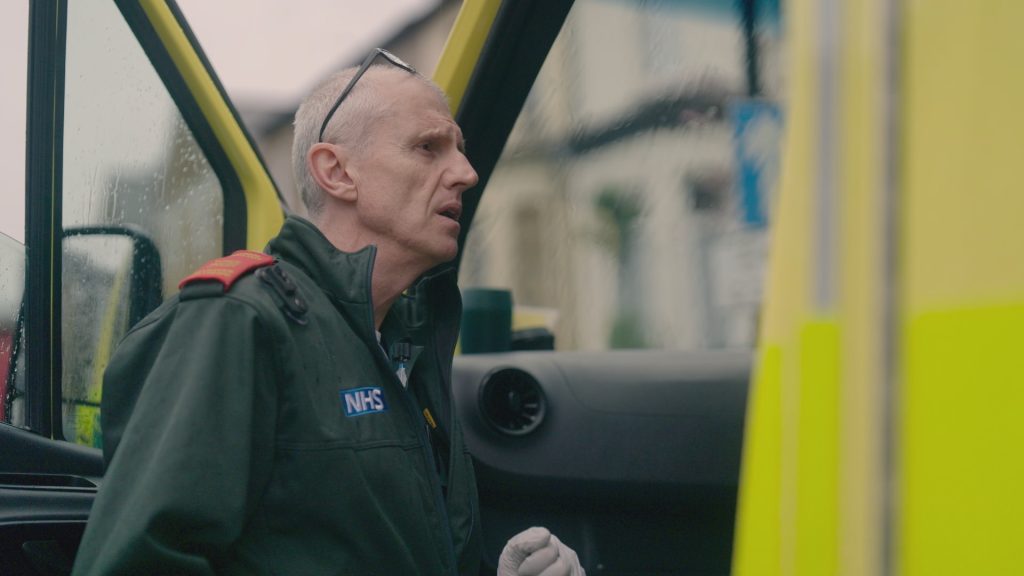“It’s so strange appearing dead on national TV’: Breath-taking moment when ambulance crew restart a man’s heart shown in BBC ‘Ambulance’ documentary
The dramatic moment ambulance clinicians revive a man whose heart has stopped beating as he is taken to hospital is captured on camera in tonight’s (Thursday) ‘Ambulance’ programme.

As the crew make their way to a specialist heart attack centre, 57-year-old Joe Mee goes into cardiac arrest and they use a defibrillator and perform chest compressions to restart his heart in the back of the ambulance.
The father-of-two was eating breakfast at his home in Walthamstow, north east London, when he became unwell. During the 999 call, his wife Rosa describes how he has a pain in his chest, is sweating and breathing abnormally – all potential signs of a heart attack. Soon after paramedics arrive, Joe’s heart stops beating and they must revive him using two shocks from a defibrillator and chest compressions.
They manage to stabilise him and get him in the ambulance as Advanced Paramedic Practitioner Nick Brown arrives and they set off. But with the hospital still five miles away, Joe’s heart stops once again and the clinicians must work together to bring him back to life.
Arriving at hospital, Nick tells a now-conscious Joe ‘you had a bit of a wobble we had to deal with it’. Joe is then handed over to doctors at the hospital on a hospital trolley with Rosa by his side. Joe went on the make a full recovery.
Speaking of his appearance on the show, picture editor Joe said:
“It’s very strange appearing on national television but being dead. It was like falling asleep. In the back of the ambulance, I remember hearing them say ‘I think we’re going to have to pull over’. I was leaning my head back on the trolley bed and I thought I was nodding off – but it was actually my heart stopping. The next thing I was arriving at hospital.
“I remember hearing the paramedics and doctors talking and them saying ‘two arrests and four shocks’ and I didn’t know anything about it!”
Joe is full of praise for the crews who saved him that day. He said:
“I can’t thank them enough for doing their job so well. All praise to them, they have to be so calm in that moment. I thought my job could be stressful but this put it into perspective.”
As an advanced paramedic in critical care, Nick Brown goes to many cardiac arrests each year. But speaking of the call that day, he said:
“It was a good team effort and when I arrived they had already managed to start his heart once and start getting him ready to travel to hospital. It is still an amazing feeling to know that that someone you cared for has pulled through”
And Joe’s story highlights the difference between life and death that chest compressions and defibrillators can make.
Nick added:
“The most important thing you can do for someone in cardiac arrest is use a defibrillator and perform chest compressions. These are extremely simple skills anyone can learn and I’d encourage all Londoners to sign up for training.”
When someone has a cardiac arrest – which is when the heart stops beating and pumping blood around the body – the early use of a defibrillator more than doubles their chance of survival. Analysis from London Ambulance Service shows 21 neighbourhoods where there is no access to a defibrillator, and 129 neighbourhoods where there is limited access for the local population.
Our Heart Starters campaign aims to eradicate this gap and ensure every Londoner has a defibrillator close by.
You can help us raise money for our life-saving Heart Starters campaign on our dedicated London Ambulance Charity website here or if you are feeling inspired, join us for the next London Life Hike in September to raise money for this vital cause.
The use of a defibrillator and chest compressions are easy skills to learn. You can learn more here.

Follow us on social media: